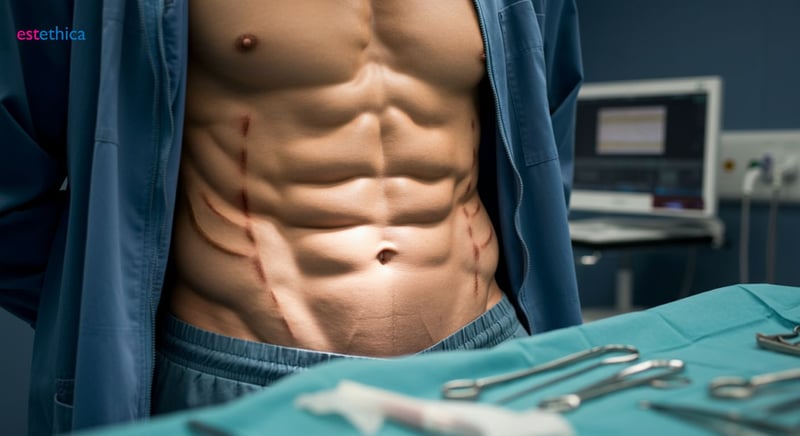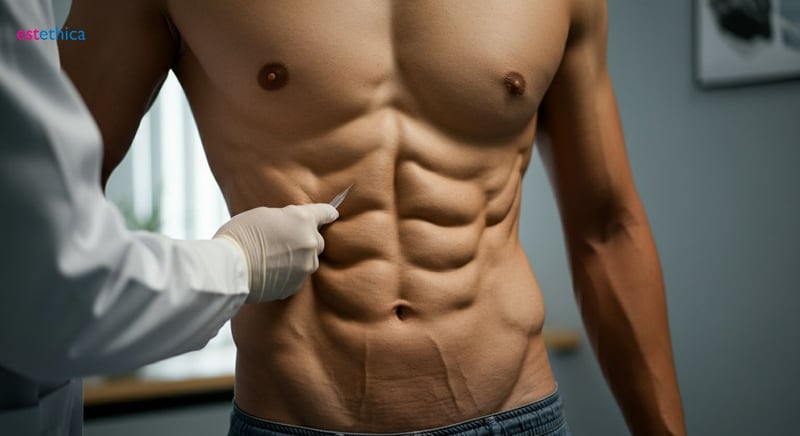Abdominal Etching: Sculpting Your Dream Six-Pack
Unlock the secret to a sculpted six-pack with abdominal etching, a precise body contouring technique for enhanced muscle definition.
Abdominal etching is a cutting-edge aesthetic surgery designed for individuals seeking to enhance their abdominal musculature by sculpting a defined six-pack. This procedure has gained traction among fitness enthusiasts and those struggling to achieve their desired results solely through diet and exercise. As a unique body contouring technique, it promises both aesthetic and psychological benefits, enhancing confidence by crafting an enviable abdominal silhouette. It is crucial to understand what this procedure entails, the differences between similar surgeries, and the recovery process to make an informed decision.
What is Abdominal Etching and How Does it Work?
Understanding the Abdominal Etching Procedure
Abdominal etching is a specialized body sculpting technique. It enhances the visibility of the abdominal muscles. This is achieved through targeted liposuction, strategically removing fat around the natural ab lines to create a more defined and athletic appearance. The precision involved differentiates it from conventional liposuction. A skilled surgeon carefully sculpts the abdomen to highlight the underlying musculature. Typically, individuals considering abdominal etching are those who already maintain a healthy lifestyle and exercise regimen but struggle to achieve the desired definition in their abdominal area. According to a survey, about 75% of patients who undergo abdominal etching report increased satisfaction with their body image.
Key Steps in Abdominal Etching
- Initial Consultation: Begins with a thorough assessment by a qualified surgeon who evaluates the patient’s muscle structure and skin elasticity to determine suitability for the procedure.
- Anesthesia Administration: The surgery is performed under anesthesia to ensure patient comfort and minimize any potential discomfort during the fat removal and sculpting process.
- Fat Removal and Sculpting: Small incisions are made, and specialized liposuction techniques are employed to precisely remove fat, accentuating the natural lines of the abdominal muscles.
Ideal Candidates for Abdominal Contouring
- Individuals with good overall health who maintain a regular exercise routine.
- Those who have realistic expectations about the results.
- People who have stubborn fat deposits around their abdominal muscles that do not respond to diet and exercise.

Six-Pack Surgery: Is it Right for You? Candidacy Explained
Determining Good Candidates for Abdominal Etching
Six-pack surgery, or abdominal etching, is most effective for those who are already committed to a healthy and active lifestyle. Ideal candidates often possess a physique that is lean but lacks the desired definition due to stubborn fat deposits. This procedure serves as a finishing touch, accentuating existing muscle tone rather than creating it from scratch. Individuals considering abdominal etching should be within a reasonable range of their ideal body weight, generally having a BMI under 30. Candidates must also have realistic expectations about the outcomes of the surgery.
Qualities of an Ideal Candidate
- Maintains a stable weight and a healthy diet.
- Engages in regular physical activity, including strength training.
- Has localized fat deposits that obscure abdominal muscle definition.
Pre-Surgical Assessment and Expectations
- Comprehensive Evaluation: A surgeon assesses muscle structure and fat distribution to determine if abdominal etching is appropriate.
- Realistic Goal Setting: Candidates must understand that abdominal etching enhances existing muscle definition rather than creating muscles.
- Health Review: A thorough review of the patient's health history ensures they are fit for surgery, which, according to the American Society of Plastic Surgeons, can reduce complication rates.

Abdominal Contouring vs. Tummy Tuck: Understanding the Differences
Differentiating Abdominal Etching from Tummy Tuck
While both abdominal contouring and tummy tuck procedures aim to improve the aesthetic of the midsection, they differ significantly in technique and outcomes. Abdominal contouring focuses on the removal of fat to enhance muscle definition, whereas a tummy tuck removes excess skin and may involve muscle repair, primarily used for postpartum or post-weight loss conditions. About 65% of individuals seeking body sculpting options are concerned about the appearance of excess fat around their midsection. Understanding these differences is crucial for patients to make informed decisions about which procedure best suits their aesthetic goals. The choice between abdominal etching and a tummy tuck depends on individual body conditions and desired results.
Key Differences and Goals of Each Procedure
- Abdominal Contouring: Primarily targets fat removal to accentuate muscle definition. This is often chosen by those near their ideal body weight.
- Tummy Tuck: Addresses excess skin and muscle repair. It will provide significant benefits to individuals post-pregnancy or after major weight loss.
- Body Sculpting: A broader term encompassing various methods to reshape the body, where abdominal etching focuses specifically on creating a six-pack appearance.
Ideal Candidates and Expected Outcomes
- Abdominal Etching Candidates: Best suited for individuals with good muscle tone seeking enhanced definition through fat removal.
- Tummy Tuck Candidates: Ideal for those with significant skin laxity or weakened abdominal muscles, often requiring more extensive surgical intervention.
- Realistic Expectations: Understanding the limitations of each procedure is crucial. Abdominal etching enhances existing muscle tone, whereas a tummy tuck primarily addresses skin and muscle issues.

Recovery After Abdominal Etching: What to Expect & Timeline
Navigating the Post-Surgery Phase After Abdominal Etching
The journey following abdominal etching focuses heavily on allowing the body to heal and adapt to its new contours. Initially, patients might experience swelling and bruising. This is normal and resolves over time. Pain is typically managed with prescribed medication. Compression garments will be important. These garments support the abdomen, reduce swelling, and help the skin adhere to the new contours. Light activities aid in circulation and prevent blood clots. Complete visibility of the results is subject to the body’s healing. About 80% of initial swelling subsides within the first few weeks. Adhering to all postoperative guidelines provided by your surgeon enhances the body’s healing.
Key Steps for Optimal Recovery
- Follow Medical Advice: Strictly adhere to the post-operative instructions provided by your surgeon to minimize complications.
- Manage Swelling: Use compression garments as directed to reduce swelling and support the healing tissues.
- Maintain Light Activity: Engage in gentle activities. Walking helps promote circulation and reduces risk of blood clots.
Enhancing Long-Term Results After Abdominal Etching
- Maintaining a stable weight after abdominal etching can affect the longevity of the results.
- Regular exercise helps preserve muscle tone and definition achieved through the surgery.
- Following a healthy diet supports overall health, reduces fat accumulation, and aids in maintaining the sculpted look.
Precision Abdominal Sculpting with Targeted Liposuction Technique
Comprehensive Post-Surgical Support for Optimal Healing and Contouring
Frequently Asked Questions
What exactly is Abdominal Etching, and how does it differ from traditional liposuction?
Who is considered an ideal candidate for Six Pack Surgery or Abdominal Etching?
What are the key differences between Abdominal Contouring (etching) and a Tummy Tuck?
What can I expect during the recovery time after abdominal etching surgery?
How can I ensure the longevity of my results after undergoing abdominal etching?
Ready to discover your aesthetic potential with estethica's expert care?
📞 Book Your Free Consultation!